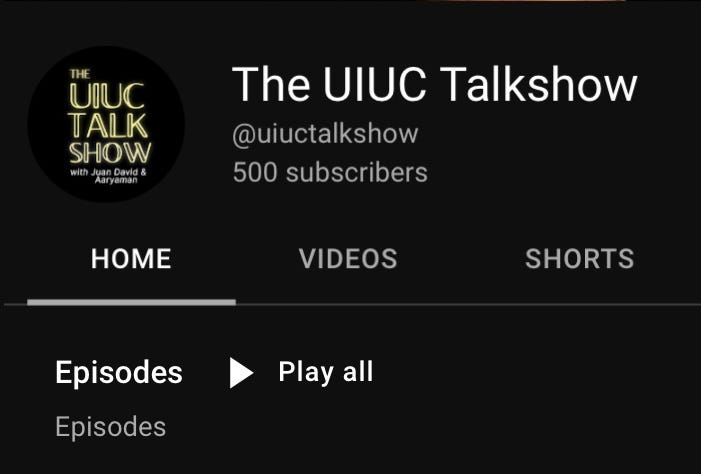Juan David’s Newsletter - February 26th, 2023
The Flexible Disciplinarian: How to Achieve Your Goals by Balancing Rigidity and Self-Deception
Morning,
On Thursday night, we were celebrating a friend’s birthday, and between telling stories and jokes, the thought of running a half-marathon the next morning crept into my mind.
“Ok, let’s do it1,” I said.
The birthday ended, and I went to sleep but was too excited. I kept waking up throughout the night:
“2:00 AM. Is it time to go?”
“4:00 AM. Alright, let’s go now!”
“5:45 AM. Too early, still.”
“7:00 AM. LET’S GO!!!!!!!!!!”
I sprang out of bed with excitement and impatiently got dressed. I hastily donned a thin cotton t-shirt and a pair of shorts. But just when I was about to leave, I thought to check the weather, and I saw we were below the freezing point at exactly 20°F (-7°C), so I had to come back and put on some pants, jacket, gloves, and hat.
I forgot my glasses, but once I was out, I wouldn't return. I also nibbled on a portion of eggs and a banana, not wanting to weigh my body down because I wanted to minimize any excuses from my body such as, “I’m not running as fast because I didn’t eat.”
Excited, dressed, and fueled. The running began.
My audacious goal was to conquer the formidable distance of 13.1 miles or 21 kilometers. That seems daunting, but you really feel it in the first three miles.
In the first mile, I'm besieged by a barrage of doubts and uncertainties such as, “Is it too cold?” or “Are you sure you’re ready to do this?”
By the second mile, my shins begin to throb and ache with each step.
By the third mile, I was far enough that returning would be six miles, and now, there was no way home, and I'm not even Peter Parker.
Initially, I did not worry about my goal and told myself, "If I don't feel like it, I can come back." That is only on the surface because deep down, giving up and cutting the run short was NOT AN OPTION. But if I tell myself, "I AM FINISHING NO MATTER WHAT." I will actually give up quicker.
Did I trick myself? That's right. I said, "Sure, you can come back at any time," but deep down, I smirked and said, "You're finishing this, so be quiet and move your legs. Also, enjoy it."
Let's describe this using a meme. This self-deception method can be applied to running, writing, studying, procrastinating, etc.
Tell yourself it's ok to give up to reduce the pressure but at the same time, deep down, you know you want to do it so you're finishing and doing whatever thing you want to do. Once you gain momentum, giving up becomes harder than doing what you want to do.
I used this trick and continued running.
1 mile? Tough. 2 miles? It’s cold. 3 miles? Ok, I guess we’re doing it. 4 miles? Ok, I'm in too deep; if I come back now, that will be 8 miles anyways. I might as well do a half-marathon.
6-7-8 miles? Let's do this. Momentum achieved. 9-10-11 miles? Way too cold; my eyes are blinded by the frigid air, rendering me unable to blink or see clearly, but we're powering through. 12-13? We are almost finished. Now, let's run as hard as we can.

This principle isn't just true in running, but rather a fundamental principle in nature: when to be rigid and flexible, and when you combine, you achieve the “impossible.”
Skyscrapers are the perfect example.
A towering skyscraper may seem rigid and unyielding, standing tall and proud against the sky. But in reality, it is a living, breathing entity, constantly adapting to the forces of nature that surround it.
With each gust of wind that blows through its steel and concrete frame, the building sways and bends, flexing its muscles and testing its limits.
And yet, for all its apparent flexibility, the building remains steadfast and secure, its foundation anchored deep in the earth. Like a tree bending in the wind, it knows how to bend without breaking, absorbing the forces that threaten to tear it apart and emerging stronger for the experience.

For those who look closely, there is an ineffable beauty that transcends the limits of language and expression to be found in this dance of strength and flexibility. It is a reminder that even the mightiest structures are not invincible, but must learn to adapt and evolve in order to survive. And in doing so, they become not just buildings, but living works of art, shaped by the forces of the world around them.
I applied this principle not for building a skyscraper but for running a half-marathon, creating projects, and pushing the “limits.”
Dancing between “Yeah, it’s fine. I’ll give up” and “I will finish no matter what” is how you experience The Way or achieve anything you want.
Now, I look back and say, “Oh, I did it.”
But the story does not end with running. I relentlessly pushed myself beyond my limits to actually see what my limits are. I pressed on, driven by an unquenchable thirst for reaching infinity.
After I finished my run, I went on a tour of a recycling plant, which I'll talk about on another day.
I finished the tour, and at this point, it's been 4 hours since I drank a drop of water, so I decided to go to the gym, where I drank some water and decided to break any personal records. The main highlight was benching over 225 lbs.
Even after I finished that, I didn't experience a drop in energy.
I considered fasting for the whole day, but I had burned over 2,000 calories, and that might not have been the wisest decision as I still had class and other things later in the day.
The day continued and I went to class. After that, a friend invited me to bouldering, and I was ready for another workout. For the first time, it was more challenging than I thought, and I was surprised at how much creativity you need to conserve your energy and use your body most efficiently.
A day of running a half-marathon, benching over 225 lbs, and bouldering. The more energy you spend, the more you get.
Notice how I never used the words2 “tired” or “exhausted.” Language creates reality. Being precise with your vocabulary is one of the best things you can do to improve your life. It is a powerful thing to choose our words carefully, for they shape not only our reality but also our perceptions of it3.
This reminds me of The Giver. In the community, people aren’t allowed to be vague with their words. They aren’t allowed to say popular idioms like “I’m starving” when they’re hungry.
Why?
Once, when he had been a Four, he had said, just prior to the midday meal at school, “I’m starving.” Immediately he had been taken aside for a brief private lesson in language precision.
He was not starving, it was pointed out. He was hungry. No one in the community was starving, had ever been starving, would ever be starving.
To say “starving” was to speak a lie. An unintentioned lie, of course. But the reason for precision of language was to ensure that unintentional lies were never uttered.
― From The Giver
Words have power and will make things happen whether you intended them or not. Our society is built upon these vague and imprecise phrases like “I’m dying” when laughing, “I’m angry” when bothered, or “I’m sad” when feeling under the weather.
If you’re precise with your language and understand how to dance between flexibility and discipline, you can achieve a state of balance and harmony that allows you to navigate the world with greater ease and grace. By being mindful of the words we choose and the actions we take, we can cultivate a sense of intentionality and purpose that brings us closer to our goals, aspirations, and self-mastery.
Knowing others is intelligence; knowing yourself is true wisdom.
Mastering others is strength; mastering yourself is true power.
— From Tao Te Ching
My experience of running a half-marathon taught me the interplay of discipline and flexibility, and how to balance between giving up and pushing through. This principle is not only applicable to running but also to other aspects of life, such as creating projects, writing, learning something new, and pushing limits. Like a skyscraper that flexes and adapts to the forces of nature, we too must learn to be both strong and flexible in order to succeed. By finding this balance, we can achieve great things and become living works of art, shaped by the challenges we face.
The UIUC Talkshow has reached 500 subscribers. Vanity metrics have never been the goal, but getting 500 subscribers on a YouTube channel is tough. We achieved this in a year. In comparison, I've published nearly 200 videos on my personal YouTube channel, and I'm still far from 200.
This week was quite remarkable for The UIUC Talkshow for three reasons. 1) first anniversary, 2) 500 subscribers, and 3) we recorded the 50th episode.
What a week! See you Next Sunday.
Ciao,
Juan David Campolargo
There is great value in challenging ourselves to do hard things, even when they arise unexpectedly. Running a half-marathon, for instance, is undeniably difficult, but the discipline and determination required to complete it can be incredibly beneficial. Of course, it is important to acknowledge that a half-marathon, while challenging, is not nearly as difficult as the struggles that many people face in their daily lives.
By avoiding words like "tired" or "exhausted," we can create a different reality for ourselves - one that is filled with energy, vitality, and possibility. Instead of focusing on our limitations, we can focus on our strengths, our potential, and the endless opportunities that lie before us.
In doing so, we shift our mindset from one of scarcity to one of abundance, from one of weakness to one of strength. We begin to see the world in a different light, one that is filled with beauty, wonder, and infinite possibility.
So let us choose our words wisely, and let them be a reflection of the best that is within us. Let us speak of courage, of resilience, of hope, and of joy. For in doing so, we create a reality that is not only more beautiful, but also more true.







Very well said. Words speak volumes, especially when they are to yourself.
Truly a remarkable week for The UIUC Talkshow (but we're just getting started!!)